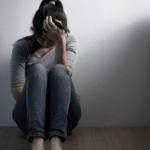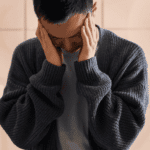10 Self-Care Tips for Managing Depression

Depression can make you feel like you’re constantly weighed down, and like life will always feel this hard.
However, making some small changes to your self-care can make a massive difference. Below you will find ten practical tips for self-care for depression. If you’re looking for ways to naturally lift your mood, you’ll find simple lifestyle tweaks and mindfulness techniques amongst other suggestions that can help you to feel like the weight has been lifted from your shoulders.
We’ll also give you three book recommendations that can be great for support and guidance as you heal from depression.

Key Takeaways
- Self‑care routines can support depression management and overall well‑being.
- Managing sleep, nutrition, and movement are foundational to mental health.
- Emotional self‑care — like journaling or mindfulness — helps process feelings and reduce stress.
- Social connection and support are important: Isolation can worsen depressive symptoms.
- Consistency matters: Small, regular habits often help more than occasional “big fixes.”
Table of Contents
How to Improve Mental Health Naturally
Here are ten simple and natural ways to help you improve your mental health:
1. Mindfulness Techniques for Depression
Research shows that mindfulness can help reduce the symptoms of depression, including repetitive negative thoughts.1 By practicing mindfulness, you learn to observe your thoughts without judgment and to bring your focus into the present moment.
2. Best Diet for Mental Health
Researchers have found links between good nutrition and low levels of depression. One particular study from 2022 found that eating a mostly Mediterranean diet could hugely reduce the symptoms of depression, with 36% of the patients in the study saying they had far fewer symptoms of depression after being on this diet in the study.2 This suggests a Mediterranean diet could potentially help reduce symptoms of depression.
3. Journaling for Depression Recovery
Journaling can be a great way to get your thoughts and feelings out of your head and onto a page. It can provide an emotional release, and give you the chance to reflect and to get to know yourself better. After a few weeks of writing, you might start to notice patterns in what you are regularly doing and how it might be linked to how you feel. You could feel a new sense of clarity and understanding about yourself.
Studies show that journaling can lower the symptoms of depression, improve your mood, and boost your overall well-being.3
4. Stress Management for Depression
Studies have shown that learning how to manage stress can reduce symptoms of depression.4 Keeping this in mind, there are some helpful ways to manage your stress levels, including getting enough sleep, eating a healthy diet, getting regular exercise, finding relaxing hobbies, and doing breathing exercises.5
5. Daily Routine for Depression Recovery
Evidence suggests that making daily routines can help with mental health, especially if they ensure that our basic needs (food, hygiene, sleep) are being met.6
6. How Sleep Affects Depression
Studies have found that having too little sleep or too much sleep can increase the risk of depression.7 They discovered the best amount of sleep to get was 8 hours. Building a good sleep routine with regular wake-up and sleep times can be beneficial if you have problems with sleep and depression.
7. Exercising for Depression
Exercise causes endorphins to be released in your body, which can have mood-boosting effects. It can also be a good distraction from worries and negative thoughts. It doesn’t have to be going for a 10k run either; it can be going for a walk around the block, doing some yoga, or dancing in your living room!
8. Building Resilience With Depression
Studies have shown that this type of psychological resilience helps you to feel less impacted by symptoms of depression and able to recover better.9
9. Social Connection to Ease Depression
Research shows that good social connections are one of the strongest factors that protect you against depression.10 Whether it’s a friend, family member, or support group, it’s good to spend some time with others and remind yourself that you are not alone.
10. Doing Things You Enjoy to Relieve Depression
Researchers found having a hobby is linked to lower levels of depression and an uplift in happiness, so it may be the right time for you to pick up an old pastime again.11 Even if it doesn’t instantly lift your mood, it might give you a nice break from the negative thoughts and worries that go around your head.
Best Self-Help Books for Depression
When it feels difficult to know how to best help yourself, a great book can offer guidance and hope. Three great self-help books for managing depression are:
- Feeling Good: The New Mood Therapy, by David Burns: David Burns outlines scientifically proven techniques that will lift your spirits and help you develop a positive outlook on life.
- The Mindful Way Through Depression – Freeing Yourself from Chronic Unhappiness, by Mark Williams, John Teasdale, Zindel Segal, and Jon Kabat-Zinn: Four experts deliver lessons drawn from mindfulness and cognitive therapy to demonstrate how to sidestep mental habits that lead to despair so that you can face life’s challenges with greater resilience.
- The Happiness Trap: How to Stop Struggling and Start Living, by Russ Harris: Using the six principles of Acceptance and Commitment Therapy (ACT), the author helps you to handle painful thoughts and feelings more effectively, break self-defeating habits, and create a richer and more meaningful life.
Getting Support for Depression
There are many different types of support available for you on your journey to recovery, including therapy, medications, guided self-help, and holistic approaches like mindfulness, yoga, and nutrition.
Several different therapy approaches have been found to be useful in reducing the symptoms of depression, such as:
Cognitive Behavioral Therapy (CBT): CBT for depression is a form of therapy that delves into your unhealthy thoughts and feelings, and challenges these with more positive, healthy ones. Within research, CBT is shown to be highly effective for treating depression.12
Dialectical Behavior Therapy (DBT): DBT can help you manage the intense emotions and self-damaging behaviors that often happen alongside depression. With the help of your therapist, you’ll learn new coping strategies, so life feels more manageable. Research shows that DBT can be as beneficial for people with depression as traditional medication.13
Mindfulness-Based Therapy: Mindfulness-based therapy is a therapy approach that focuses on your present-day struggles, helping you lessen the impact of your difficult thoughts and feelings on your life and depression. This approach can help you become more aware of your thoughts and develop new strategies to cope.14
Interpersonal Therapy (IPT): IPT is supposedly as effective as medication for treating depression. It works by helping you understand your personal relationships and how difficulties within these may be contributing to your depression symptoms.15

Reach Out for Treatment for Depression
At Mission Connection, we are here to help you on the road to recovery. When you choose our services, you can expect a thorough assessment by a qualified professional and a completely individualized plan to help you feel better again. We will provide you with ongoing support as well as the skills you need to manage your depression, either through inpatient treatment, outpatient therapeutic support, or a combination of the two!
Ready to take your first step on your healing journey? Contact us today to find out how we can support you.
References
- Li, P., Mao, L., Hu, M., Lu, Z., Yuan, X., Zhang, Y., & Hu, Z. (2022). Mindfulness on Rumination in Patients with Depressive Disorder: A Systematic Review and Meta-Analysis of Randomized Controlled Trials. International Journal of Environmental Research and Public Health, 19(23), 16101. https://doi.org/10.3390/ijerph192316101
- Bayes, J., Schloss, J., & Sibbritt, D. (2022). The effect of a Mediterranean diet on the symptoms of depression in young males (the “AMMEND: A Mediterranean Diet in MEN with Depression” study): a randomized controlled trial. American Journal of Clinical Nutrition, 116(2), 572–580. https://doi.org/10.1093/ajcn/nqac106
- Baikie, K. A., & Wilhelm, K. (2005). Emotional and physical health benefits of expressive writing. Advances in Psychiatric Treatment, 11(5), 338–346. https://doi.org/10.1192/apt.11.5.338
- Najimi, A., Abbasian, F., Meftagh, S., Ghasemi, G., & Afshar, H. (2014). The effect of stress management training on stress and depression in women with depression disorders: Using cognitive-behavioral techniques. Journal of Education and Health Promotion, 3(1), 70. https://doi.org/10.4103/2277-9531.134819
- Renner, H. (2018, August 14). Depression and stress management. Healthline. https://www.healthline.com/health/depression/stress-management#what-the-expert-says
- Hou, W. K., Lai, F. T., Ben-Ezra, M., & Goodwin, R. (2020). Regularizing daily routines for mental health during and after the COVID-19 pandemic. Journal of Global Health, 10(2). https://doi.org/10.7189/jogh.10.020315
- Dong, L., Xie, Y., & Zou, X. (2021). Association between sleep duration and depression in US adults: A cross-sectional study. Journal of Affective Disorders, 296, 183–188. https://doi.org/10.1016/j.jad.2021.09.075
- Carek, P. J., Laibstain, S. E., & Carek, S. M. (2011). Exercise for the treatment of depression and anxiety. The International Journal of Psychiatry in Medicine, 41(1), 15–28. https://doi.org/10.2190/pm.41.1.c
- Jiang, Y., Yi, Z., Yao, Y., Hu, Y., Li, F., & Ma, H. (2023). Effects of college students’ mindfulness on depression symptoms during the epidemic prevention and control period: The mediating effect of psychological resilience. Frontiers in Psychiatry, 13. https://doi.org/10.3389/fpsyt.2022.991449
- De Risio, L., Pettorruso, M., Collevecchio, R., Collacchi, B., Boffa, M., Santorelli, M., Clerici, M., Martinotti, G., Zoratto, F., & Borgi, M. (2023). Staying connected: An umbrella review of meta-analyses on the push-and-pull of social connection in depression. Journal of Affective Disorders, 345, 358–368. https://doi.org/10.1016/j.jad.2023.10.112
- Mak, H. W., Noguchi, T., Bone, J. K., Wels, J., Gao, Q., Kondo, K., Saito, T., & Fancourt, D. (2023). Hobby engagement and mental wellbeing among people aged 65 years and older in 16 countries. Nature Medicine, 29(9), 2233–2240. https://doi.org/10.1038/s41591-023-02506-1
- Cuijpers, P., Berking, M., Andersson, G., Quigley, L., Kleiboer, A., & Dobson, K. S. (2013). A Meta-Analysis of Cognitive-Behavioural Therapy for Adult Depression, Alone and in Comparison with other Treatments. The Canadian Journal of Psychiatry, 58(7), 376–385. https://doi.org/10.1177/070674371305800702
- Meygoni, A. K. M., & Ahadi, H. (2012). Declining the rate of major Depression: Effectiveness of Dialectical Behavior therapy. Procedia – Social and Behavioral Sciences, 35, 230–236. https://doi.org/10.1016/j.sbspro.2012.02.083
- APA. (n.d.). Depression treatments for adults. https://www.apa.org. https://www.apa.org/depression-guideline/adults
- Cohen, Z. D., Breunese, J., Markowitz, J. C., Weitz, E. S., Hollon, S. D., Browne, D. T., Rucci, P., Corda, C., Menchetti, M., Weissman, M. M., Bagby, R. M., Quilty, L. C., Blom, M. B. J., Altamura, M., Zobel, I., Schramm, E., Gois, C., Twisk, J. W. R., Wienicke, F. J., . . . Driessen, E. (2024). Comparative efficacy of interpersonal psychotherapy and antidepressant medication for adult depression: a systematic review and individual participant data meta-analysis. Psychological Medicine, 54(14), 3785–3794. https://doi.org/10.1017/s0033291724001788
Depression Self-Care FAQs
Self‑care involves daily practices — like sleep, nutrition, movement, rest — that support emotional and physical health. These habits can help stabilize mood and reduce depressive symptoms.
Basic self‑care includes healthy sleep and diet, regular physical activity, and emotional self‑care like journaling or mindfulness. Social support and setting boundaries are also essential.
Consistency counts. Aim for daily or regular self‑care rather than occasional efforts. Even small, repeatable habits can add up over time.
Self‑care supports mental health, but it’s not a substitute for professional help when needed. If depression symptoms persist or worsen, a mental‑health professional should be consulted.
It’s common to lack motivation. Try starting small — a short walk, brief rest, simple healthy meal — and gradually build a routine. Small steps still matter.
- Signs of Treatment-Resistant Depression
- Signs of Depression Relapse
- Depression-Related Sleep Issues
- Depression Symptom Checklist
- ICD-10 Criteria for Depression
- Major Depressive Disorder (MDD) Symptoms
- Depression Symptoms
- Depression Self-Test
- PHQ-9 Depression Test
- Warning Signs of Depression
- Types of Depression
- Best Therapies for Depression
- Talk Therapy for Depression
- Telehealth for Depression
- Personalized Therapy for Depression
- Holistic Treatment for Depression
- Online Therapy for Depression
- Effective Treatments for Depression
- Medications for Depression
- Treatment-Resistant Depression Options
- Depression Relapse Prevention






